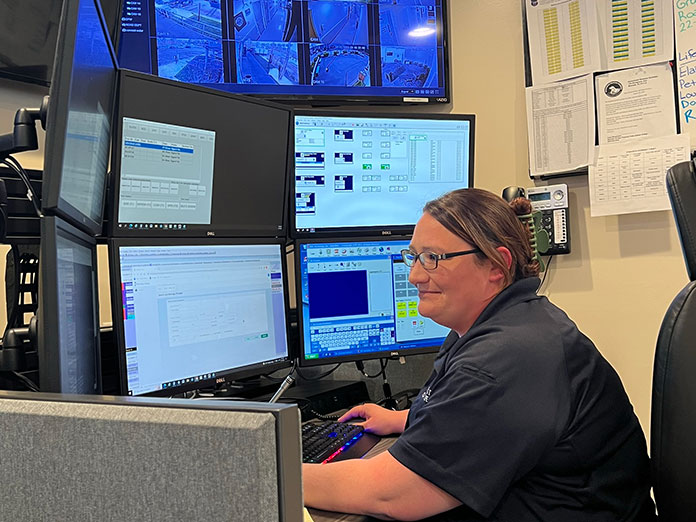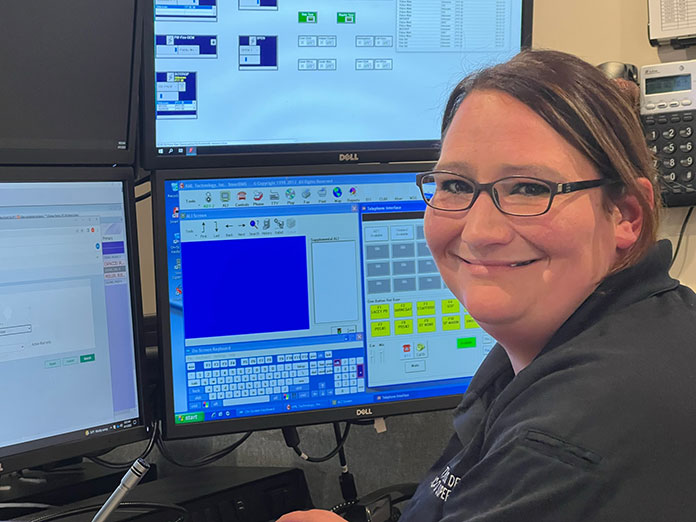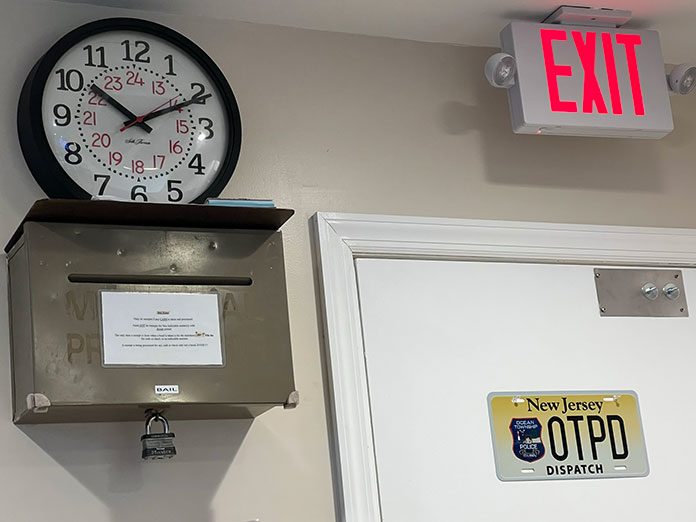
WARETOWN – From her station in the Township of Ocean’s police department, Ashley Damodio is one of eight rotating dispatchers answering the telephone when the potential for chaos strikes.
Despite the Ocean County Sheriff’s Office Communications Division initially answering 9-1-1 calls, Damodio recognizes that every telephone ring could signify a caller in distress or need of help. As a result, her voice exudes a calm and reassuring tone as she announces her name to the person on the other end of the line.
Damodio, 37, began working as a dispatcher a year after she graduated from Southern Regional High School. A friend told her about the open position, which sounded like it could be a better fit than her job back then.
“I was working at a nursing home as a CNA,” said Damodio. “I really enjoy helping people, but I hurt my back.”
Once hired, Damodio received on-the-job training leading to in-house certification. Three months of sitting with a more experienced worker included reviewing various systems in the local communications center.

Four separate monitors in the room contain views of sixteen separate areas throughout the 20-square-mile municipality. Different channels sound off with information throughout the day. An analog clock on the wall conveniently integrates military time into its display.
As part of her training, Damodio said she needed to learn different codes and abbreviations, as well as the phonetic alphabet (alpha, bravo…). She also mastered communicating by private written chat utilizing a special device.
Dispatchers are crucial in motor vehicle stops, and she said a great deal of emphasis is placed on the significance of supporting officers in the field. For example, she might be asked to check to see if a registration matches a vehicle or search to see if a driver has outstanding warrants.
As she delved deeper into how officers depended on local dispatch, the phone rang at that moment, almost as if to provide a live example. One of the road cops wanted Damodio to determine whether a vehicle pulled over for a routine traffic stop was covered by insurance. The driver vehemently insisted they’d just forgotten to place their updated insurance card in the glove compartment.
The extra step may have stopped the car owner from an expensive tow off the road. Damodio made some calls and subsequently advised the officer that the vehicle’s insurance was current.
Damodio admitted that even the seemingly simplest of motor vehicle stops puts her on alert. She monitors situations and is prepared to respond quickly to provide backup when necessary. One of her main concerns includes ensuring the safety of the officers – who she readily refers to as her family.
“I worry about them when they’re out there,” she confessed. “If I feel their safety is in jeopardy, it’s that same ‘mom’ feeling you get when they don’t answer you and you’re checking on them. It hits you the same way any time you turn around and can’t find your kid.”
With no prior knowledge of the call volume, her twelve-hour shifts as a dispatcher are unpredictable. The local department handles calls coming in from the non-emergent line and dispatches police and first aid emergency calls from the county’s 9-1-1 system. Fire dispatch is not managed from the local police headquarters.
Damodio’s overall demeanor reflects her many years of experience as she conveys a sense of confidence and competence to the people she encounters through her work. The seasoned dispatcher instinctively knows that even callers on the non-emergent line may need some handholding over the phone.

The Township of Ocean Police Department serves as a lifeline support system to some elderly members of the community who live alone. Damodio explained that each individual is expected to call every morning and let the dispatcher know they’re okay.
“Some of them try to make a joke of the whole thing,” she said. “They’ll even try to make me laugh by telling me they’re still alive.”
She admitted it’s the unspoken that carries importance with these types of daily tasks. Damodio builds a sense of familiarity with regular callers, and there have been instances where she has dispatched an officer to conduct a wellness check because something felt off. She also calls those who miss their scheduled check-ins and arranges for an officer to visit if there is no response.
Dispatchers often serve as the first point of contact for individuals in distress, including those who may be considering taking their own lives. Similarly, calls for help in domestic violence incidents require a high level of sensitivity and quick decision-making to assess the situation accurately and provide the appropriate support.
You can’t hang up on calls like that,” Damodio shared. “I stay on the phone with them until an officer gets there, and we hopefully keep someone from hurting themselves or getting injured as part of a domestic.”
Multi-tasking is a critical skill for dispatchers who must juggle numerous responsibilities simultaneously. Not only do they need to swiftly and efficiently handle incoming calls, but dispatchers are also expected to gather information, coordinate responses, and communicate with emergency personnel.

The biggest challenge is managing to remain calm and composed under pressure.
While the term “dispatcher” is commonly used by the general public to refer to the person who takes initial calls for assistance, some prefer the alternate job title of “communications operator.” With 18 years of experience in coordinating calls, it’s no surprise that Ashley Damodio’s role has evolved into that of Communications Supervisor.
Her dedication to her job also earned her recognition as the local community’s 2021 Civilian of the Year award.
“The civilian of the year is chosen by our officers and our supervisors,” said Police Chief Michal Rogalski when the award was presented at a local government meeting last year. “They each get a vote, send it to my office, and that’s how we make the selection.”
While Damodio never had the chance to review the notes leading to her award, one thing seems clear. The seasoned dispatcher’s approach to handling emergency and non-emergent calls speaks volumes about her unwavering dedication to her pledge to help others in their time of need.







